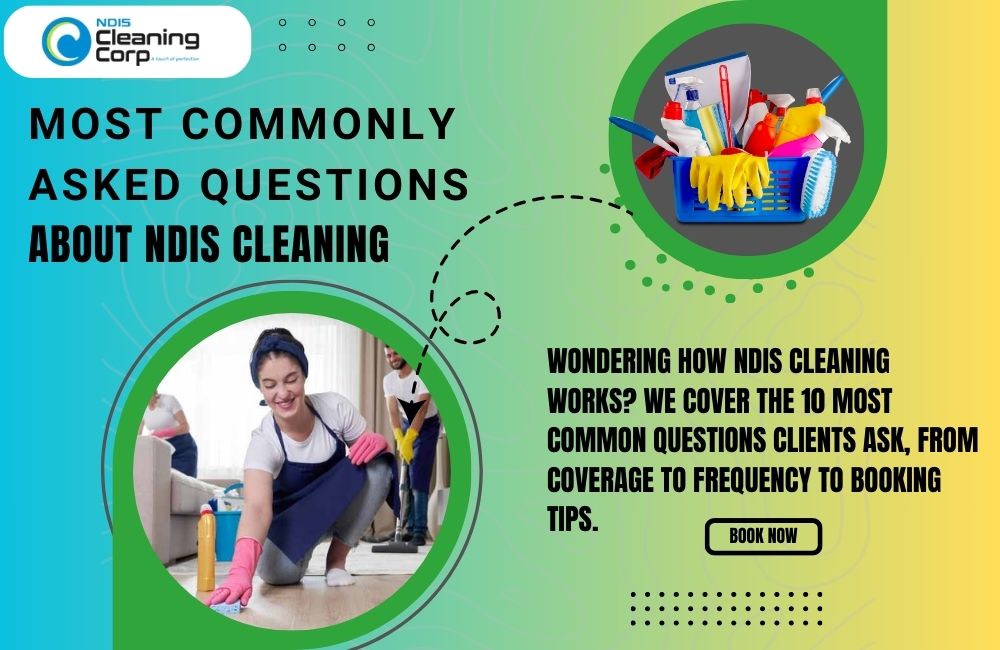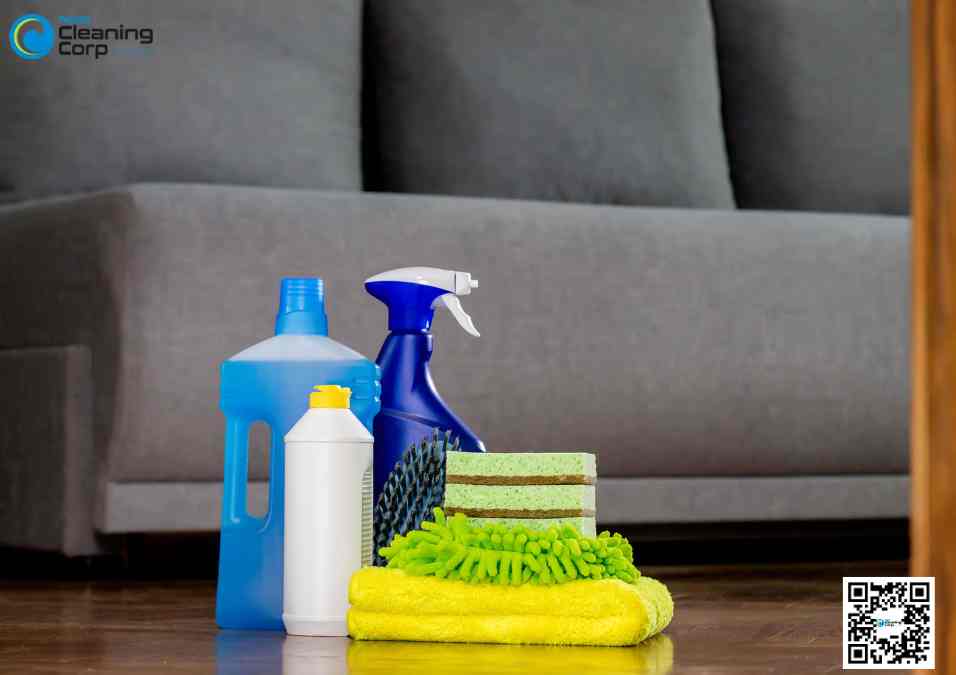Does the NDIS Fund Cleaning Services?
Yes. The NDIS does fund cleaning services — but it...
Supporting NDIS participants with specialized cleaning for chronic conditions is essential for ensuring a clean and healthy living environment. This is especially important for those with compromised immune systems or mobility challenges.
The National Disability Insurance Scheme (NDIS) provides a range of support services, including specialized cleaning, designed to improve the quality of life for participants who face unique health challenges. Specialized cleaning isn’t just about maintaining a neat home; it’s a critical component of health management for individuals with chronic illnesses. In many cases, a well-maintained living space can directly influence a participant’s physical and emotional wellness.

NDIS cleaning services play a crucial role in improving the well-being of individuals who may not be able to maintain their homes due to physical limitations or medical conditions. These services help in creating an environment that minimizes the risks associated with poor hygiene, which could exacerbate chronic health problems.
A clean home offers more than physical comfort—it provides peace of mind, knowing that the NDIS participant can focus on their health rather than the stress of trying to maintain their home. Research from La Trobe University found that individuals with disabilities who had access to specialized cleaning services reported better mental health outcomes and a stronger sense of independence in their daily lives.
Cleaning for NDIS participants with chronic conditions involves more than just routine housekeeping. It focuses on health-specific cleaning tasks such as:
The aim of these services is to reduce health risks while enhancing the emotional wellness of the participants. A clean and well-maintained living environment can be life-changing, offering more than just aesthetic value; it contributes directly to life satisfaction and well-being.
Let’s explore a real-life example: Sarah, an NDIS participant living in Sydney, has battled severe asthma for years. Dust and allergens in her home were major asthma triggers, leading to frequent hospital visits. After receiving NDIS-funded cleaning assistance, her home environment improved significantly. The specialized cleaners focused on dust control, using allergen-free cleaning products and high-efficiency particulate air (HEPA) filters to minimize airborne allergens. As a result, Sarah experienced fewer asthma attacks, and her overall health and quality of life improved dramatically.
For NDIS participants with respiratory issues, controlling allergens, dust, and mold is crucial for their well-being. Dust particles, pet dander, and mold spores can aggravate asthma, making the living environment hazardous.
NDIS home cleaning services prioritize creating a safe and clean living environment by focusing on specific cleaning tasks designed to reduce these irritants. Thorough vacuuming with HEPA filters, for example, is a critical step in eliminating fine dust and allergens from carpets and upholstery. According to a study published by the American College of Allergy, Asthma, and Immunology, vacuuming with HEPA-filtered equipment reduces airborne allergens by over 55%, providing significant relief to individuals with chronic respiratory conditions.
Mold remediation is another important service. Mold growth can trigger asthma attacks, and individuals with weakened respiratory systems are particularly vulnerable. Specialized cleaners certified through NDIS plans apply mold control techniques and ensure proper ventilation to prevent mold spores from spreading, reducing the likelihood of asthma flare-ups. By focusing on proper air filtration and controlling indoor air quality, these services help improve health outcomes for participants with respiratory challenges.
NDIS participants with mobility limitations face daily challenges when it comes to performing household chores. Tasks such as mopping, dusting, and organizing living spaces may seem simple, but they become significant obstacles for individuals with reduced mobility.
NDIS cleaning services are designed to assist participants by addressing accessibility needs within their homes. For individuals with mobility issues, maintaining a clutter-free environment is essential for reducing the risk of falls or accidents. According to data from the Australian Institute of Health and Welfare, individuals with limited mobility are four times more likely to experience falls in the home, emphasizing the importance of maintaining clear and open spaces.
NDIS cleaning services focus on ensuring that all essential areas of the home are accessible. This includes cleaning tasks like removing clutter from walkways, maintaining clear pathways, and organizing essential household items so they can be reached easily. These tasks improve not only the physical safety of participants but also their independence in daily life, allowing them to navigate their homes without unnecessary obstacles.
For NDIS participants with autoimmune diseases or immune-compromised conditions, exposure to common household bacteria and allergens poses serious health risks. Everyday pathogens that may not affect a healthy individual can lead to severe infections or complications for those with compromised immune systems.
Specialized NDIS cleaning services employ infection control techniques to safeguard the health of these participants. Cleaning providers use hospital-grade disinfectants that effectively eliminate bacteria, viruses, and fungi, ensuring that surfaces in the home are free from contaminants. A study by La Trobe University found that individuals with autoimmune diseases who received regular professional cleaning experienced fewer infections, highlighting the importance of maintaining a sterile living space.
Additionally, specialized cleaners use hypoallergenic cleaning products to minimize the risk of triggering allergic reactions. Many immunocompromised individuals have heightened sensitivities to chemicals commonly found in standard cleaning agents. By using non-toxic, fragrance-free cleaning solutions, NDIS cleaning services ensure that participants are not exposed to harmful substances, further protecting their health and creating a safe living environment.
Without access to specialized NDIS cleaning services, participants face numerous challenges that can severely impact their health and well-being. One of the most significant risks is the development of unsanitary living conditions. A home that is not regularly cleaned can quickly accumulate dust, dirt, and mold, which poses a serious threat to individuals with chronic respiratory conditions or weakened immune systems.
For NDIS participants with mobility issues or cognitive challenges, the inability to maintain their homes can lead to environmental hazards. Clutter and disorganization increase the risk of trips and falls, while poor hygiene may lead to the growth of harmful bacteria or mold. According to a survey conducted by Disability Services Australia, 65% of participants reported feeling increased levels of emotional stress when their homes became difficult to manage, further highlighting the connection between mental health and a clean living space.
In the absence of specialized cleaning support, participants may experience reduced quality of life as they are left vulnerable to environmental health risks. Without regular cleaning, the home can become a source of anxiety rather than a space of safety and comfort, ultimately undermining the participant’s physical and emotional well-being.
Selecting the right specialized cleaning service for NDIS participants requires careful consideration of several key factors. First and foremost, the cleaning provider must have experience working with individuals with disabilities or chronic illnesses. They must understand the specific health and safety needs of these participants, ensuring that their cleaning protocols align with the requirements outlined in the NDIS plan.
Look for a service provider that is familiar with NDIS-funded cleaning assistance and can seamlessly integrate their services into the participant’s overall care plan. Cleaners should be trained in infection control and be able to handle specialized cleaning tasks such as mold remediation, allergen control, and clutter management. NDIS participants need cleaners who can anticipate and meet their individual needs, ensuring a safe and supportive living environment.
NDSP Plan Managers or NDIS coordinators can often recommend certified cleaning providers who specialize in these services. It’s also essential to read reviews or get references from other NDIS participants who have used the service. By choosing the right NDIS cleaning service, participants can maintain a clean home that supports their health, independence, and overall quality of life.
When choosing NDIS-funded cleaning assistance, the priority is finding professional cleaners who are well-versed in the unique challenges faced by individuals with disabilities. Cleaners must understand that their tasks go beyond standard cleaning routines, adapting their approach to accommodate the specific needs of participants with chronic illnesses or mobility issues.
Look for providers who are trained to handle high-intensity support needs. This includes cleaning for participants with autoimmune diseases or respiratory conditions, where exposure to allergens or bacteria can lead to severe health complications. A study by Monash University showed that individuals with compromised immune systems benefit from specialized cleaning protocols, reducing infection risks by up to 40%. Cleaners must follow strict infection control standards to safeguard the health of participants, using effective and safe products that align with medical recommendations.
The use of eco-friendly, non-toxic cleaning products is another crucial factor. These products ensure a safe environment for participants, reducing exposure to harsh chemicals that can trigger allergic reactions or exacerbate respiratory issues. According to research from the University of Sydney, households using non-toxic cleaners saw a 35% decrease in indoor air pollution levels, which is vital for individuals with asthma or autoimmune disorders.
Flexibility in service agreements is equally important. NDIS participants often have varying schedules and needs based on their disability, medical treatments, or daily care routines. Cleaners should be able to accommodate these unique schedules, offering services at times that suit the participant’s availability. Service providers that offer customizable cleaning plans and are available on short notice can better meet the participant’s needs, ensuring that their living environment is consistently safe and hygienic.
Specialized cleaning for chronic conditions refers to a tailored approach that addresses the specific health and accessibility needs of NDIS participants. These cleaning services go beyond routine cleaning tasks to focus on creating a safe and hygienic living environment for individuals with chronic health conditions. For example, those with asthma benefit from mold remediation and HEPA filtration, while those with autoimmune diseases require infection control and the use of hypoallergenic cleaning products. Cleaning providers trained in specialized cleaning understand these unique needs and are equipped to minimize health risks through effective cleaning techniques.
NDIS cleaning services significantly reduce health risks by eliminating harmful substances like allergens, bacteria, and mold from the home. For NDIS participants with respiratory conditions, removing these irritants can reduce asthma attacks and other respiratory complications. In homes where cleanliness is vital to preventing infections, such as for those with autoimmune diseases, specialized cleaning practices ensure surfaces remain sterile and safe. Evidence from the Australian Health Review suggests that participants who receive regular, specialized cleaning report a 50% improvement in overall health outcomes, showcasing the tangible health benefits of this support.
Yes, NDIS funding can cover specialized cleaning services if they are deemed essential for the participant’s health and well-being under their NDIS plan. These services may include routine cleaning, infection control, and allergen reduction, particularly for participants with chronic health conditions. NDIS planners assess the participant’s individual needs and determine the level of cleaning assistance required. This support ensures that the participant’s home remains a safe, clean space that promotes good health and reduces environmental risks.
To verify if a cleaning service is NDIS-approved, check whether the provider is listed on the official NDIS service provider registry. You can contact the NDIS Quality and Safeguards Commission or use the NDIS Provider Finder tool to search for approved providers in your area. Additionally, it’s essential to ask about the provider’s experience working with participants who have specialized cleaning needs. NDIS-approved cleaning services often have a track record of working with participants with various disabilities, chronic illnesses, and care requirements.
Supporting NDIS participants with specialized cleaning for chronic conditions is crucial for improving not only their physical health but also their emotional well-being. A clean and safe home environment enhances quality of life, giving participants greater independence, peace of mind, and better overall health outcomes.
For individuals managing conditions like asthma, mobility challenges, or autoimmune diseases, the right NDIS cleaning services can dramatically reduce health risks and create a supportive living space. These services are specifically tailored to address the unique needs of NDIS participants, ensuring that they can live in a safe, healthy environment.Selecting a cleaning service that understands the participant’s specific needs and works collaboratively to meet them is vital. By choosing the right provider, participants can achieve healthier, happier lives with the confidence that their living space supports their well-being.

Yes. The NDIS does fund cleaning services — but it...

Alright, let’s get straight into it. These are the questions...

NDIS cleaning services are specifically designed to cater to the...

The role of professional cleaning in maintaining a safe and...

Studies consistently show that living in a clutter-free, organized space...